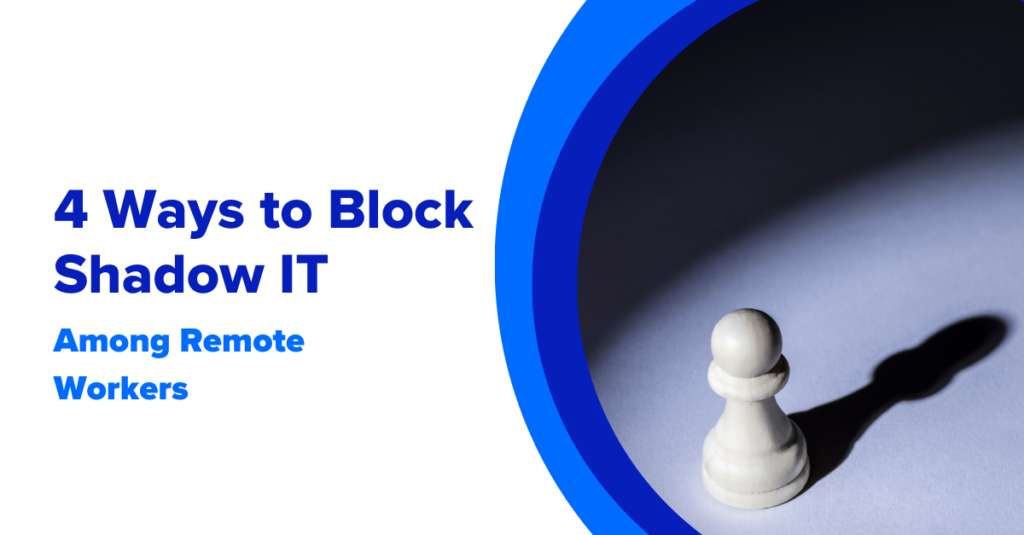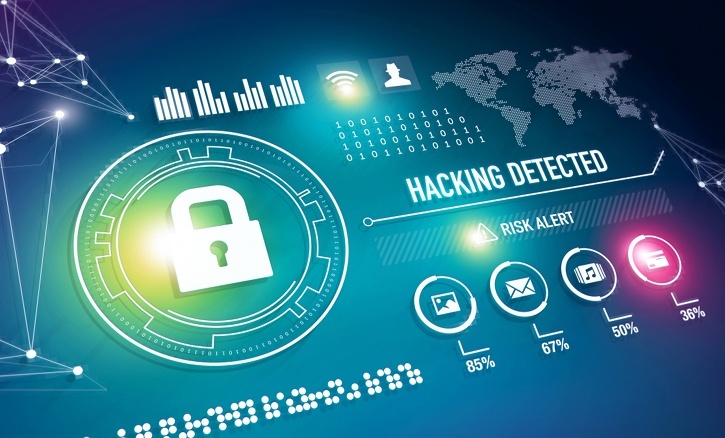How to Prevent Shadow IT Among Remote Employees

“Shadow IT” is the term used for when employees use software, applications, or devices that have not been authorized by the IT department. It might be as simple and innocent as an employee copying and pasting information into an unapproved app because it’s faster and easier. Think of how many people use popular consumer messaging apps (e.g., WhatsApp), unapproved cloud storage (e.g., Google Drive), big file transfer (e.g., WeTransfer), or personal email accounts (e.g., Gmail) for work purposes. While it may seem harmless, shadow IT poses significant risks to the organization’s security and data integrity and may create hidden dangers that can explode at any moment.
Companies across many industries have faced data breaches, financial losses, and reputational damage due to unauthorized IT activities. According to an IBM report, nearly 7 in 10 organizations were compromised by Shadow IT from 2021 to 2022.
The increased prevalence of remote work, with its flexibility and freedom for employees, has fueled a surge in Shadow IT. Employees working from home often use their own personal computers and, even more often, rely on their own devices and solutions that easily slip under the radar of IT. The convenience of Bring Your Own Device (BYOD) policies and managed devices further blurs the lines between work and personal use, making it all too easy for the use of unauthorized applications and website services to creep into daily operations.
This blog takes a closer look at Shadow IT, its risks, the reality, and some practical guidelines on how you can minimize exposure.
The Risks of Shadow IT
Employees need productivity tools and services to fuel their jobs. These include project management, format converters, file summarization, translation services, file scanning, storage, and many more. This wide range of available and accessible tools makes it hard for IT to keep up with the pace of employees, who are constantly finding new ones to implement. This is what brings forth Shadow IT.
The risks and security vulnerabilities from Shadow IT are magnified when these unauthorized applications and websites lack essential protection. Security vulnerabilities can leave computers open to hackers and malicious software and data loss can leave your company exposed to regulatory non-compliance. What seemed like a quick fix to an employee can easily morph into a costly nightmare for the company—along with legal implications and hefty regulatory fines. In other cases, the applications and websites might be intentionally malicious, injecting malware or facilitating breaches in the guise of productivity services.
- Security Vulnerabilities: Unapproved applications bypass the rigorous security measures set by IT departments, making them prime entry points for cyberattacks. These applications can be the weak link in your security defense line, opening doors to hackers and malicious software. The worst part? Without knowing which unapproved applications are present, your organization might not realize the extent of their vulnerabilities until it’s too late, leading to potentially devastating breaches.
- Data Loss: When employees use unauthorized applications, they put the company and themselves at risk for data loss. These tools may lack proper data protection protocols, making them prone to unauthorized access. Moreover, the lack of visibility into these tools complicates recovery efforts, leaving organizations scrambling to mitigate the damage.
- Non-Compliance: Shadow IT can also lead to non-compliance with industry regulations and standards. Regulatory bodies require stringent adherence to data security protocols, and unauthorized tools often fail to meet these standards. Beyond hefty fines and legal actions, this can severely damage your company’s reputation.
- Inconsistent Data Management: Reliable, consistent data is crucial for strategic planning, and Shadow IT undermines this by introducing discrepancies. This can make it challenging to maintain a cohesive and accurate data ecosystem, affecting the overall efficiency of the organization.
Real-World Examples and the Reasons Behind the Rise of Shadow IT in Remote Work
In August 2022, login credentials for Microsoft’s GitHub infrastructure were unintentionally exposed by several employees. This incident had the potential to give attackers access to Azure servers and other internal systems, creating significant security risks. Fortunately, the breach was discovered by a cybersecurity firm before any damage could occur. This example underscores the importance of stringent security practices and regular audits of exposed credentials. (Source: Code42)
In another incident, an employee at Cash App Investing retained access to sensitive data even after being fired because his access permissions were not removed properly. This oversight led to a breach affecting the data of 8.2 million customers. The breach not only prompted a class-action lawsuit but also highlighted the critical need for proper termination protocols and continuous monitoring of user activity. (Source: Ekran System)
Why are savvy companies still being exposed to threats from shadow IT?
In dynamic work environments, the need for unauthorized tools can prompt employees to seek third-party applications that promise immediate results. Remote workers may require software for recording meetings, file extraction, or task management, leading them to solutions not vetted by IT. When existing tools like Virtual Desktop Infrastructure (VDI) slow things down, employees may look for more efficient alternatives, often turning to Shadow IT. And there is always the temptation from the internet’s vast array of easily accessible, user-friendly third-party solutions that will encourage employees to bypass official channels.
A lack of awareness about security protocols, often due to inadequate IT training or communication, can also leave employees unaware of the potential consequences of using unauthorized tools. This ignorance can lead to the widespread use of convenient but risky applications. Feelings of disconnect among remote workers exacerbate the issue, and they may turn to unsanctioned communication tools like WhatsApp, Zoom, or Telegram to feel more connected and productive. To address this, you’ll need to foster a sense of inclusion among remote employees and set up better IT resources that will anticipate and meet their needs—while maintaining security standards.
Strategies to Prevent Shadow IT
Although Shadow IT is becoming ubiquitous, here are some strategies and guidelines to mitigate the risk and minimize exposure.
Enhanced IT Support and Resources
- Accessible and Responsive IT Support: Making sure IT support is accessible and responsive to the unique needs of remote workers will discourage employees from seeking unauthorized solutions. By addressing issues promptly, IT departments can build trust and reduce the temptation to use Shadow IT.
- Expand the Toolkit: Give every employee a comprehensive toolkit with all the tools needed for their tasks. By using a proactive approach, you can reassure employees that they have everything needed to perform their jobs efficiently—without resorting to unauthorized applications. Remember to regularly update and expand this toolkit based on employee feedback and evolving needs.
- Rapid detection, review, and decision making: IT support needs the ability to quickly detect the presence of a new application or use of a new site. The user should be notified of the detection and potential blocking while a focused due diligence review is triggered. Decisions can range from “OK to use”, “License is required [and why]”, “Use X instead”, to “Not allowed because…”. Over time, IT support will build an inventory of the detected/requested applications, current acceptance, approved alternatives, and frequency of requests. Frequent requests for the same application may indicate a functionality shortfall in the currently approved application suite.
Education and Awareness Training
- Regular Training Sessions: When employees understand the risks of shadow IT, they’ll more naturally be mindful and cautious of what tools they use. Conduct regular training sessions on the importance of various IT policies and the risks of non-compliance. These sessions should be interactive and tailored to address the specific challenges of remote work.
- Engage Employees: Involve employees in discussions about the dangers of Shadow IT and encourage them to communicate their IT needs. This engagement fosters a collaborative approach to finding solutions that work for everyone.
Demarcate Work and Personal Activities
- Set Clear Boundaries: Establish clear boundaries to separate between work and personal activities on devices. Policies that differentiate work applications from personal ones, will reduce the risk of cross-contamination. Clear guidelines will also help employees understand and adhere to these policies.
- Maintain Privacy: Building a culture of trust ensures that security protocols are not seen as intrusive. Let your employees know that their personal activities remain private while you are enforcing security measures for work-related tasks. This balance is crucial for maintaining a positive remote work environment.
Implement a Secure Enclave
- What is a Secure Enclave: Introduced by Venn, a Secure Enclave is a new approach to securing remote work on any unmanaged computer without VDI. The company-controlled Secure Enclave, installed on the user’s PC or Mac, is an area where all data is encrypted and access is strictly controlled. This solution centralizes administrative control over work data, applications, and peripheral use. Work applications run locally within the enclave, where business activity is isolated and protected from any personal use on the same computer. Company data is protected without IT having to control the entire device.
- Capabilities of a Secure Enclave: When a user launches an application in ‘work’ context, Venn puts a virtual wrapper around it, visually indicated by the Blue Border. That work application is then running inside the Secure Enclave, which acts like a firewall, controlling what can go in or out—reducing the risk of data leaks and breaches. Security policies include the ability to restrict tasks like moving data, printing, clipboard copy/paste, screen sharing, uploads, and more. The secure enclave is simple to use, cost-effective, and easy to support. It’s secure and complies with regulatory requirements, and companies can onboard and offboard remote workers in minutes.
- Meeting Employee and Business Needs: Venn’s configurable policies control which applications are purposed for work and only applications assigned to a user by an admin are permitted to run in Venn. Once inside the enclave, applications are subject to admin-configurable DLP policies that govern functions such as copy/paste, screen sharing, printing, downloads and more. The secure enclave allows employees to use the tools and applications they need within a secure framework that balances productivity and security. This approach is ideal when it comes to maintaining high-security standards and supporting remote work efficiency.
Securing the Future
Addressing Shadow IT is crucial for maintaining security and compliance in remote work settings. This blog covered vital strategies like enhancing IT support, providing thorough training, clearly separating work and personal activities, and deploying a Secure Enclave.
Think of a Secure Enclave as a digital fortress for remote employees, offering a safe space where sensitive data and applications can operate securely. This technology not only prevents unauthorized access but also ensures compliance with regulatory standards for a robust defense against Shadow IT.
Explore the capabilities of the Secure Enclave to discover how this powerful technology can protect your data while helping your remote employees work more securely and efficiently.

Scott Lavery
SVP Marketing
More Blogs


